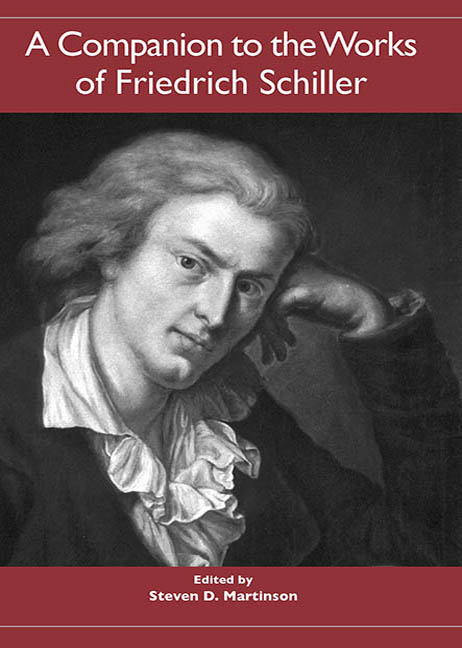Book contents
- Frontmatter
- Dedication
- Contents
- Acknowledgments
- The Works of Friedrich Schiller
- Editions and Abbreviations
- Introduction: Schiller and the New Century
- Intellectual-Historical Settings
- Major Writings
- Die Räuber: Structure, Models, and an Emblem
- Kabale und Liebe Reconsidered
- Great Emotions — Great Criminals?: Schiller's Don Carlos
- Concerning Aesthetic Education
- “On the Shores of Philosophy”: Schiller's Lyric Poetry, 1795
- Wallenstein
- Maria Stuart: Physiology and Politics
- Die Jungfrau von Orleans
- Wilhelm Tell
- Schiller's Legacy
- Works Cited
- Notes on the Contributors
- Index
Die Jungfrau von Orleans
from Major Writings
Published online by Cambridge University Press: 28 April 2017
- Frontmatter
- Dedication
- Contents
- Acknowledgments
- The Works of Friedrich Schiller
- Editions and Abbreviations
- Introduction: Schiller and the New Century
- Intellectual-Historical Settings
- Major Writings
- Die Räuber: Structure, Models, and an Emblem
- Kabale und Liebe Reconsidered
- Great Emotions — Great Criminals?: Schiller's Don Carlos
- Concerning Aesthetic Education
- “On the Shores of Philosophy”: Schiller's Lyric Poetry, 1795
- Wallenstein
- Maria Stuart: Physiology and Politics
- Die Jungfrau von Orleans
- Wilhelm Tell
- Schiller's Legacy
- Works Cited
- Notes on the Contributors
- Index
Summary
1.
In his last two completed plays, not counting the “fate tragedy” Die Braut von Messina (The Bride of Messina, 1803), Schiller, the German Shakespeare as he was known in the 1780s, seems to have taken a leaf from the master's book: in Die Jungfrau von Orleans (The Maid of Orleans, 1802) and Wilhelm Tell (1804), tragedy yields to a more conciliatory, indeed redemptive mood, culminating in the triumph and glorification of “Romantic nationalism” (Reed, 97) or related noble sentiments. Not surprisingly, both plays rank highest among Schiller's plays in popularity. All-time favorites of open-air theaters and amateur productions, their “Romantic” pageantry, miraculous events, grandiose scenic effects, and musical intermezzi have the broad appeal of opera. Arguably, there is even a touch of kitsch in them, and they are to this day an inexhaustible reservoir of familiar quotations without which no newspaper or cocktail party would be quite the same.
Yet both are also serious, philosophically charged historical dramas. In Tell, Romantic nationalism glorifies the triumphant political liberation movement of the Swiss cantons; in Jungfrau, it leads up to the apotheosis of the patriotic heroine at the moment when she has turned the tide of the war in favor of her country and a victorious outcome of the struggle for national autonomy is in sight. In each play, the course of history confirms or validates the high-minded aspirations of the protagonist, even suggesting a near-utopian future. This is strange if we remember that in the mid-1790s, Schiller had rejected his idealistic, teleological, and therefore optimistic conception of history, and its lofty promise of ultimate justice (“die Weltgeschichte ist das Weltgericht”) in favor of a thoroughly skeptical, indeed disillusioned concept of history — history as a jumble of random events without ulterior meaning and certainly without the seeds of progress of any kind (Hofmann in Oellers, 371–79).
But this apparent contradiction between the historical plays and their author's view of history becomes irrelevant once we realize that in all of his historical plays, Schiller focuses not so much on the course of history and its ulterior meaning as on the prominent man or woman caught up in it. He did so in Fiesko and Don Carlos, before his supposed disillusion with history, and again in Wallenstein and Maria Stuart after it.
- Type
- Chapter
- Information
- A Companion to the Works of Friedrich Schiller , pp. 227 - 246Publisher: Boydell & BrewerPrint publication year: 2005

